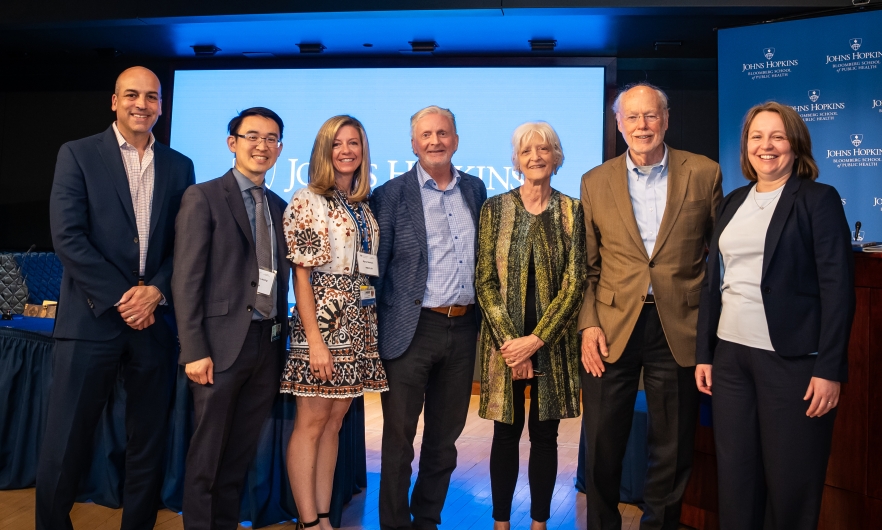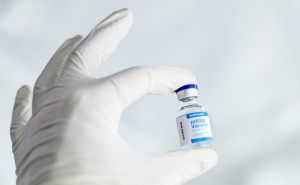research@BSPH Launches Innovation Translation Council

Pictured (from left to right): Sebastian Seiguer, Anthony Leung, Myra Norton, Gregory Kirk, Ellen MacKenzie, Phillip Sharp, and Aleks Baranczak.
On May 19, research@BSPH hosted Nobel Laureate Phillip Sharp, institute professor and professor of biology emeritus at MIT, in addition to a mix of internal and external community leaders to celebrate the launch of the Innovation Translation Council (ITC).
Spearheaded by Anthony Leung, PhD, MBioch, professor in Biochemistry and Molecular Biology, and Gregory Kirk, MD, PhD ’03, MPH ’95, vice dean for research and professor in Epidemiology, the ITC was formed by investigators with a drive and passion for translating their research into impact.
Made up of 15 Bloomberg School faculty, students, and staff members with an interest or background in public health research translation—and with representation from Health Advisory Board members—the ITC will provide the School community with resources to translate innovation that impacts communities.
Dean Ellen MacKenzie understood the value of creating an innovation-oriented initiative and oversaw the ITC launch in one of her final actions as dean of the Bloomberg School.
At the council launch event, Sharp spoke about his 1972 discovery of mRNA splicing, the importance of RNA research, and how foundational knowledge turned into revolutionary medical solutions—including mRNA vaccines—which impact millions globally today.
"The health care industry is inefficient. We need to optimize better controls, measurements, outcomes, and decisions for each patient," Sharp said. "But this motivation needs to come from the health care providers and the people developing technology, and we have a problem integrating that on both ends."
Sharp went on to say that it might be easier to integrate technologies from the commercial sector, but it is more difficult to do so in the health care sector. To ensure accessibility, he added, public health professionals should consider how to design systems that more effectively deliver these health care innovations.
Sharp addressed recent developments in AI, engineering, and public health, such as the advantages in using AI to make critical cancer diagnoses earlier and AI as a health care organization and management system, as well as recent developments in imaging tools and nanoscale-level synthesis and fabrication.
After his keynote, Sharp was joined onstage for a panel discussion featuring Aleks Baranczak, chief program officer at Blackbird Labs, Myra Norton, senior director of business initiatives at JHTV, and Sebastian Seiguer, CEO and co-founder of Scene Health.
The panelists discussed how public health and commercialization may create opportunities for both synergies and tension. The experts gave advice on how public health practitioners should approach their research with an innovative lens and the changes necessary to reimagine and recreate the U.S. health care system. To listen to recordings of the panel discussion, visit the ITC website.
Council chair Anthony Leung closed the event with an overview of the council’s goals and strategy for the coming year:
- Educate the School community on how to apply their research to innovation translation through a range of resources, such as guides, lectures, or presentations.
- Engage stakeholders who are interested in supporting research projects pertinent or advantageous to their sectors through networking sessions or liaisoning collaborations.
- Elevate research projects conducted by the School's investigators and spread the word of success from past innovation-forward research projects.
To accomplish these goals, the council employs three working groups:
- Idea: This working group focuses on pre-market innovation, project foundation, and development.
- Trailblazer: This group targets research projects that are ready for the market.
- Compass: The group develops and organizes more compliance and social responsibility efforts in the Bloomberg School's innovation translation.
Review the ITC website for upcoming internal and external innovation-oriented events and resources for public health investigators.





